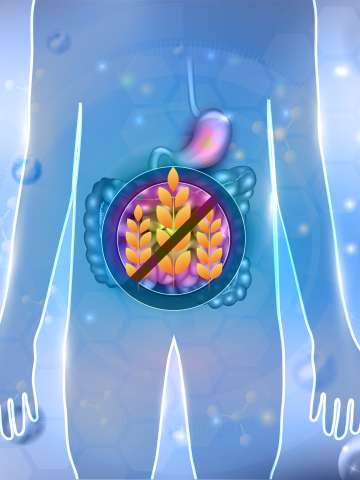Celiac Disease
We specialize in treating adults and adolescents with celiac disease. Our expert team of gastroenterologists and GI dietitians diagnose and manage all gluten-associated disorders with customized nutrition plans, education, support and medications.

Why choose the UCLA Health Celiac Disease Program?
Our experienced team specializes in caring for adults and adolescents with celiac disease and other gluten-associated disorders. Our leading celiac disease experts provide accurate diagnoses and medical management including individualized nutrition and wellness plans.
Highlights of our program include:
Dedicated team of experts: You receive coordinated care from a team of celiac disease specialists. Our gastroenterologists screen and diagnose disorders. We then work closely with experts in other subspecialties when necessary, including dermatology, endocrinology, rheumatology and neurology, to deliver comprehensive treatments. Our primary goal is to help you control celiac disease while preventing complications.
Customized nutrition plans: Expert GI dietitians work with you to tailor your gluten-free diet to optimize your nutrition. We have extensive experience helping people with celiac disease and other gluten-associated disorders. After a thorough dietary consultation, we create individualized nutrition plans to optimize your health and quality of life.
Commitment to research: We are passionate about improving the quality of life of people with celiac disease and other gluten-associated disorders. Our experts established the , an online registry that helps us better understand the natural history of your condition. Using information from confidential surveys, this database helps us advance celiac disease research and enhance therapies.
Our areas of care
At the UCLA Health Celiac Disease Program, we provide the full range of care for people with celiac disease and other gluten-associated disorders. You benefit from comprehensive evaluations and treatment plans developed just for you. We specialize in:
Precise diagnostics
We are national leaders in diagnosing celiac disease. We work with experts from UCLA Health GI pathology and laboratory medicine to deliver an accurate diagnosis. After reviewing your symptoms and medical history, we may recommend:
Blood tests: These tests screen for specific antibodies related to celiac disease.
Genetic testing: These tests look for markers that put you at a higher risk of celiac disease.
Endoscopy with small intestine biopsies: To look for inflammation that is typical in celiac disease, we may recommend a capsule endoscopy (you swallow a pill-like device with a tiny camera that takes pictures of your GI tract). Or we may use deep enteroscopy, which uses a long, flexible tube with a camera and small tools.
Our experts are highly skilled at distinguishing between gluten-associated disorders that may be causing your symptoms. These include celiac disease, non-celiac gluten sensitivity, fructan intolerance and wheat allergy. Treatments for these conditions vary, so an accurate diagnosis is essential.
Customized nutrition plans
Specialized GI dietitians play an integral role in helping you manage celiac disease and other gluten-associated disorders. At the UCLA Health Celiac Disease Program, our GI dietitians specialize in gluten-free diets to optimize your nutrition and reduce or eliminate symptoms. We educate and empower you to take control of dietary changes and adopt new habits that fit into your life.
You receive helpful guidance about:
- Reading labels and detecting “hidden” gluten that may be called something other than gluten
- Discovering tasty gluten-free recipes and adjusting other recipes to remove gluten
- Ordering gluten-free meals from restaurant menus
Our GI dietitians also incorporate dietary needs for other co-occurring conditions. We play an essential role in managing ongoing symptoms that commonly occur with gluten-associated disorders that are not directly linked to gluten intake. Examples include lactose and fructose intolerance, disorders of gut-brain interaction and additional food intolerances.
Coordinated care for other health concerns
People with celiac disease are more likely to have other gastrointestinal issues. These include small intestinal bacterial overgrowth (SIBO), specific sugar malabsorption and microscopic colitis.
Our experts also work closely with specialists across UCLA Health to address conditions that are associated with celiac disease including dermatitis herpetiformis, Hashimoto’s thyroiditis, Graves’ disease, gluten neuropathy, gluten ataxia and more. You have access to top specialists in dermatology, endocrinology, neurology and rheumatology.
Gluten-associated conditions we treat
Our specialists are uniquely qualified to treat the full range of gluten-associated conditions. We deliver comprehensive treatments for:
Celiac disease
Celiac disease is one of the most common autoimmune conditions. It is a chronic digestive disorder that causes inflammation in the small intestine. This inflammation happens after eating gluten (protein fragments of wheat, rye and barley). Gluten causes an abnormal immune response in people who have celiac disease. The disease tends to run in families, meaning that it may be inherited.
Symptoms and signs of celiac disease include:
- Abdominal bloating
- Constipation
- Diarrhea
- Fatigue
- Infertility
- Iron deficiency anemia
- Malnutrition
- Neurological changes like neuropathy, migraine, and mood disorders
- Osteoporosis
- Weight loss
Non-celiac gluten/wheat sensitivity (NCGS)
Unlike celiac disease, NCGS is not an autoimmune disorder and is not inherited. After eating gluten, people with NCGS have symptoms similar to celiac disease, but the disorder does not damage the intestines.
Symptoms of non-celiac gluten sensitivity include:
- Abdominal pain or cramping
- Diarrhea and constipation
- Gas and bloating
- Lack of energy
- Mental fatigue ("brain fog")
Wheat allergy and food intolerances
Wheat allergy and other food allergies result from an abnormal immune response to a specific food. The immune response can cause a rash and hives, breathing problems, vomiting and diarrhea. We work closely with our colleagues in allergy-immunology to treat these issues.
Other digestive disorders
We have experience treating complex and rare digestive disorders. Our experts use advanced imaging studies, capsule endoscopy, deep enteroscopy, and other assessments to diagnose and treat:
Autoimmune enteropathy, a rare disorder that causes excessive diarrhea and leads to severe malabsorption. With special antibody testing and endoscopy evaluation, we diagnose and manage your condition.
CVID-enteropathy, damage and irritation in the intestines that is associated with common variable immune deficiency (CVID), a disorder that increases the risk of infection.
Eosinophilic GI disorders (EGID or previously eosinophilic gastroenteritis), a rare spectrum of diseases that can affect the esophagus (eosinophilic esophagitis), stomach (eosinophilic gastritis), small bowel and/or colon (eosinophilic enteritis and/or colitis). Depending on the location of the disease, symptoms may include difficulty swallowing, heartburn, nausea, vomiting, diarrhea and abdominal pain. Management often includes new medications and/or an elimination diet.
GI conditions, including gastroesophageal reflux disease (acid reflux or GERD) and IBD.
Microscopic colitis, a type of inflammatory bowel disease (IBD) that leads to watery diarrhea. This condition includes two sub-types: lymphocytic colitis and collagenous colitis. Unlike ulcerative colitis or Crohn’s colitis, the inflammation in the colon can mostly be seen only with a microscope and therefore requires biopsies during a colonoscopy.
Mast-cell activation syndrome (MCAS), a condition that causes recurring allergy symptoms and diarrhea.
Treatment for celiac disease
The treatment for gluten-associated disorders starts with a gluten-free diet. Our specialized GI dietitians work closely with you to create gluten-free nutrition plans. We also help you adopt healthy lifestyle changes and optimize nutrition. We accompany you as you adjust to new habits that greatly improve your quality of life. If needed, we utilize medical treatments for non-responsive celiac disease, refractory celiac disease and co-occurring disorders.
Meet our team
Our team includes expert gastroenterologists and specialized GI dietitians with extensive experience in celiac disease, non-celiac gluten sensitivity and wheat allergy. We coordinate with specialists in dermatology, endocrinology and neurology to provide comprehensive care.
Contact us
Our gastroenterologists and GI dietitians deliver customized care for celiac disease and other gluten-associated disorders. Call to connect with a specialist.
Find your care
Our gastroenterologists and GI dietitians deliver customized care for celiac disease and other gluten-associated disorders. Call to connect with a specialist.
